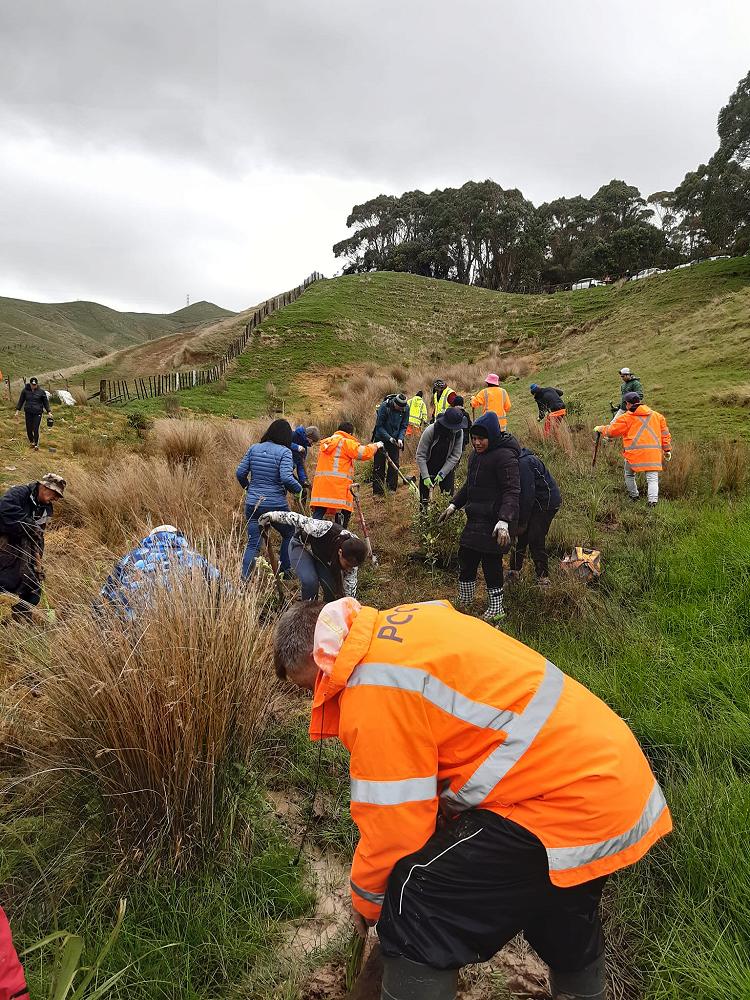
Wesley Community Action working to minimise its environmental impact
Pulling on a pair of rubber gloves and sorting through a week’s worth of rubbish isn’t everyone’s idea of a fun day at the office but kaimahi at Wesley Community Action have taken it in their stride, gamely tangling with their colleagues’ used teabags, empty food packets and discarded paper towels to help measure the organisation’s waste.
They’ve now carried out waste audits at four of Wesley’s seven sites. It’s grubby work but it’s an important step towards helping Wesley minimise its environmental impact.
The waste audits have been initiated by Team Taiao which was set up last year to look at what Wesley Community Action can do to lead and foster positive environmental action.
“Our goal is to grow awareness of our environmental impact and implement new measures that reduce our carbon footprint,” says Team Taiao coordinator, Kirsten Gendall.
She says taking steps as an organisation to help counteract the impact of climate change fits with Wesley’s kaupapa on a number of levels. It’s a way of setting a good example and ‘walking the talk’ when it comes to taking steps to reduce carbon emissions – particularly as many of the whānau they work with are likely to be the most affected by climate change.
It also fits with Wesley’s commitment to helping build and sustain healthy systems.
“By taking action to enable nature to heal, we also support good health in our social systems.”
Team Taiao, which is made up of staff from throughout the organisation, has identified a number of key areas to focus on, starting with measuring and reducing the organisation’s carbon emissions and reducing the amount of waste that gets sent to landfill.
The team is working with two external organisations to help it achieve these goals. EKOS helps organisations to measure their carbon footprint then develop plans to reduce it, while Para Kore is a kaupapa Māori zero-waste organisation.
EKOS has now measured Wesley’s carbon emissions and helped Team Taiao set targets to reduce them – a short-term reduction of 15% and a long-term reduction of 60%. That will be achieved by a number of measures, including increasing the number of electric cars in Wesley’s fleet.
The waste audits involved collecting and saving a week’s worth of rubbish at each site, then sorting through it to identify what was being thrown out and how those quantities could be reduced.
The audits have thrown up some interesting results. Kaimahi at Epworth House in central Wellington were surprised at the number of teabags they were getting rid of each week. They are now investigating alternatives, such as using compostable teabags that can be taken to a nearby composting collection point or switching to loose-leaf tea. Many teabags are sealed with substances that cannot be broken down in a domestic composting system.
The next step is to come up with a waste reduction plan for each site.
The work of Team Taiao is part of Wesley Community Action’s growing focus on the importance of caring for the environment and mitigating the effects of climate change.
“At the moment a lot of our work is looking at our internal processes and how we operate but it will become increasingly part of the community work we’re involved in,” says Kirsten. “A lot of what we do is about building resilience, including resilience to cope with climate change.”
That work is already starting to happen. Recent community initiatives with an environmental focus include a tree-planting project and a community composting scheme.
Ngahere Korowai is an ambitious project to cloak the bare hills behind Porirua East in a ngahere (forest) of native trees. It’s the brainchild of the Aotearoa Pasifika Men’s Group which meets regularly at Wesley House in Cannons Creek. They’ve been joined by Ngati Toa Rangatira, Greater Wellington Regional Council and a range of other organisations.
So far more than 7,000 trees have been planted, with more planting planned this winter.
The second initiative is a community composting scheme set up through a partnership between Te Hiko at Cannons Creek and a number of local groups. The collection bins are now in place at Awatea Kindergarten and the number of people involved in the scheme is gradually increasing.
